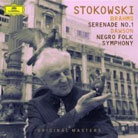July 2007
The Brahms Serenade, in one of the last recordings by the veterans of Toscanini’s NBC SO who tried to keep that orchestra alive under the name Symphony of the Air, is notable for Stokowski’s exceptional lightness of texture and his emphasis on lyricism. Stokowski gave the premiere of William Levi Dawson’s Negro Folk Symphony in Philadelphia in 1934 and continued to perform it after Dawson revised the score in 1952; in 1963 he chose this work for his first recording with his newly formed American Symphony Orchestra. The performance is a good deal more idiomatic than Neeme Järvi’s more recent one with the Detroit SO on Chandos, and the stereophonic sound is quite good in both Stokowski items. The Dawson shares the second disc with music by another 20th-century black American composer, Howard Swanson's Night Music. None of the chamber works included here really requires a conductor; Mitropoulos generously took part to show support for the Philharmonic Scholarship Winners, whose playing is consistently fine. The 1950 monophonic sound is better than ever in Ingmar Haas’s splendid transfers, as exemplified particularly in the vivid presence and fullness of David Weber’s clarinet in the Prokofiev and Swanson pieces. GO BACK TO: |
 Brahms - Serenade No. 1 in D; Dawson - Negro
Folk Symphony; Hindemith - Octet; Prokofiev - Quintet; Swanson - Night
Music
Brahms - Serenade No. 1 in D; Dawson - Negro
Folk Symphony; Hindemith - Octet; Prokofiev - Quintet; Swanson - Night
Music